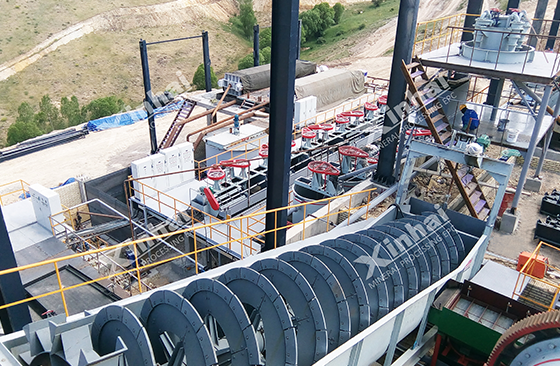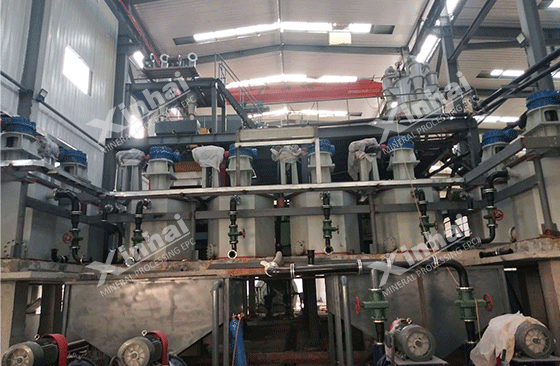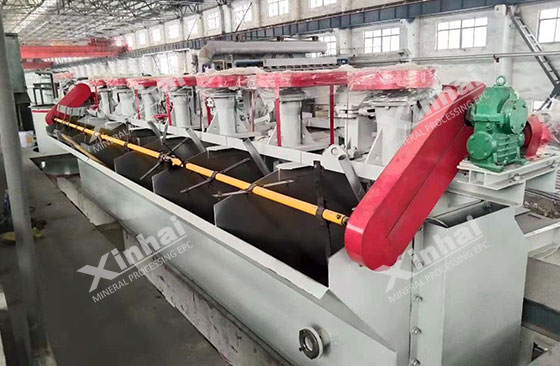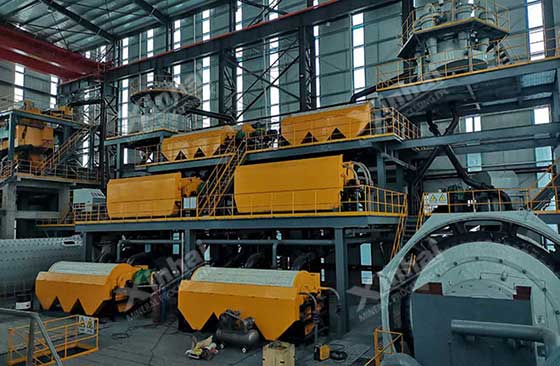
In actual production, there are many quartz sand beneficiation and purification technologies used by beneficiation plants, such as scrubbing, grading, desludging, magnetic separation, flotation, acid leaching, etc. The specific quartz sand beneficiation process should be determined according to the type, content, occurrence state of impurities in the ore and product quality requirements. Sometimes it is difficult to improve the quality of quartz sand products using a single beneficiation technology, and multiple treatment methods are needed to solve this problem. The following will introduce you to the common beneficiation and purification process of quartz sand.

During the weathering and sedimentation process of quartz sand, a large amount of clay minerals and iron impurities will be produced. These impurities are often attached to the surface of quartz ore in the form of cement or adhesion minerals. In order to remove these clay impurity minerals, mud iron and some film iron, the scrubbing-grading-desilting process is usually adopted. This process can effectively remove these impurities and improve the purity of quartz sand, thereby improving its quality and value in various applications. This process is generally used in the pretreatment process before the raw sand is selected, which can effectively remove muddy impurity minerals.
Common impurity minerals in quartz sand include weakly magnetic ores such as limonite, tourmaline, hematite and biotite, or strongly magnetic ores such as magnetite. Therefore, a magnetic separation process is needed to remove these impurity minerals. Most ore dressing plants use wet high-intensity magnetic separators for separation. The magnetic field strength is adjusted to about 13,000 Oersteds, which can effectively remove these magnetic impurity minerals.

Quartz sand scrubbing technology can be divided into two types: mechanical scrubbing and rod grinding scrubbing. The rod grinding scrubbing technology can not only enhance the scrubbing effect, but also change the particle size composition of the original sand by adding an appropriate amount of steel rods. This process not only helps to remove surface impurities more effectively, but also provides a better mineralogical basis for the subsequent sorting of quartz sand, thereby further improving the quality and purity of quartz sand. Due to the large number of impurities in quartz sand, the purity of quartz sand cannot be improved after scrubbing, desludging and magnetic separation technology, so a flotation process is also required. Flotation can effectively remove feldspar in the ore, and hydrofluoric acid flotation is generally used.

After the quartz sand ore is processed by scrubbing, magnetic separation and flotation, most of the impurity mineral particles contained in it have been effectively removed, and the purity of silicon dioxide can be increased to more than 99%, which can basically meet most industrial uses of quartz sand. In order to further purify the ore into ultra-high purity quartz sand, the impurities attached to the surface of the quartz particles in the form of spots and inclusions need to be treated with acid leaching. Different industrial uses have different requirements for the impurity content of quartz sand, so mixed acids of different concentrations and ratios need to be used for acid leaching. This process can effectively remove stubborn impurities, ensure that the quartz sand reaches ultra-high purity standards, and meet the needs of various high-end industrial applications.
After the scrubbing equipment in this process was improved, the technical parameters were optimized. The efficient and powerful scrubbing with chemical addition and graded desludging can remove more than 80% of the impurity iron and aluminum in the ore. The magnetic separation operation is mainly to remove the iron-containing impurity minerals. After the process, high-quality refined quartz sand can be obtained. If further flotation and acid leaching are carried out, high-purity quartz sand can be obtained. This process can avoid the disadvantages of low output and secondary iron pollution caused by rod mill scrubbing.

In actual production, the mineral processing plant will adjust the mineral processing process according to the specific type of quartz ore and ore characteristics. Reasonable selection or combination of different mineral processing technologies can not only effectively improve the recovery rate of quartz sand concentrate, but also significantly improve the economic benefits of the mineral processing plant while reducing production costs. Therefore, in the quartz sand beneficiation and purification process, optimizing the process flow and selecting appropriate equipment and chemicals are the keys to ensuring product quality and corporate competitiveness.
To find out more about our products and solutions, please fill out the form below and one of our experts will get back to you shortly.